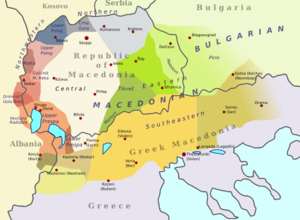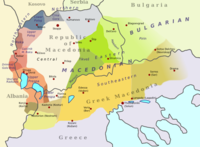| Revision as of 23:27, 24 October 2011 edit203.59.138.244 (talk)No edit summary← Previous edit | Revision as of 12:42, 15 November 2011 edit undo124.148.216.129 (talk) →Phonological characteristicsNext edit → | ||
| Line 11: | Line 11: | ||
| *as in most South(-Western) dialects, the central vowel {{IPA|/a/}} is more fronted (i.e. a cardinal {{IPA|}}) rather than the more central {{IPA|}} typical of other dialect groups | *as in most South(-Western) dialects, the central vowel {{IPA|/a/}} is more fronted (i.e. a cardinal {{IPA|}}) rather than the more central {{IPA|}} typical of other dialect groups | ||
| *the palatal affricates are typically prepalatalized: {{IPA|/ˈsvɛca/}} is realized {{IPA|}}, {{IPA|/ˈmɛɟa/}} is realized {{IPA|}} | *the palatal affricates are typically prepalatalized: {{IPA|/ˈsvɛca/}} is realized {{IPA|}}, {{IPA|/ˈmɛɟa/}} is realized {{IPA|}} | ||
| *similarly, the palatal nasal is also prepalatalized: {{IPA|/ˈjadɛɲɛ/}} is realized {{IPA|}} |
*similarly, the palatal nasal is also prepalatalized: {{IPA|/ˈjadɛɲɛ/}} is realized {{IPA|}} | ||
| * consonant ] is typical of this dialect and occurs in the following environments: | * consonant ] is typical of this dialect and occurs in the following environments: | ||
| **the etymological {{IPA|/v/}} in initial position has been lost in a number of instances: | **the etymological {{IPA|/v/}} in initial position has been lost in a number of instances: | ||
Revision as of 12:42, 15 November 2011

The Prilep-Bitola dialect (Template:Lang-mk, Prilepsko-bitolski dijalekt) is a member of the central subgroup of the western group of dialects of the Macedonian language. This dialect is spoken in much of the Pelagonia region (more specifically, the Bitola, Prilep, Kruševo and Demir Hisar municipalities), as well as by the Macedonian-speaking minority population in and around Florina (Lerin) in neighbouring Greek Macedonia. The Prilep-Bitola dialect, along with other peripheral west-central dialects, provides much of the basis for modern Standard Macedonian. Prestige dialects have developed in the cities of Bitola and Prilep.
Phonological characteristics
The phonological characteristics of the Bitola-Prilep dialect which also can also be found in the other peripheral dialects are:
- mostly antepenultimate word stress (see Macedonian phonology)
- the yat has reflexed into /ɛ/
- as in most South(-Western) dialects, the central vowel /a/ is more fronted (i.e. a cardinal ) rather than the more central typical of other dialect groups
- the palatal affricates are typically prepalatalized: /ˈsvɛca/ is realized , /ˈmɛɟa/ is realized
- similarly, the palatal nasal is also prepalatalized: /ˈjadɛɲɛ/ is realized
- consonant elision is typical of this dialect and occurs in the following environments:
- the etymological /v/ in initial position has been lost in a number of instances:
- in the sequences *vs- and *vz-; e.g. *vse > /sɛ/ (сè, "all"), *vzema > /ˈzɛma/ (зема, "to take") as is the case in the standard
- in a handful of other words: /ˈtɔrnik/ for standard /ˈftɔrnik/ (вторник, "Tuesday"), /ˈnatrɛ/ for standard /ˈvnatrɛ/ (внатре, "inside")
- the same process (bringing the pronunciation closer to their antonyms) also occurred with /ˈmnɔɡu/ (многу, "much", "a lot") → /ˈnɔɡu/
- absence of the intervocalic /v/
- in the plural forms of monosyllabic nouns, e.g. лебо(в)и:
- /ˈlɛbɔvi/ → /ˈlɛbɔi/ (realized )
- and in most other positions, e.g. то(в)ар:
- /ˈtɔvar/ → /ˈtɔar/ (realized )
- in the plural forms of monosyllabic nouns, e.g. лебо(в)и:
- certain short words (conjunctions, pronouns, adverbs, determiners, etc.) have undergone further elision, ex.:
- sega → sea → /sa/ ("now")
- tova → toa → /tɔ/ ("that")
- koga → koa → /kɔ/ ("when")
- the etymological /v/ in initial position has been lost in a number of instances:
- insertion of /t/ and /d/ into consonant clusters /sr/- and /zr/-, respectively; for example, /stram/ for the standard /sram/ (срам, "shame") and /zdrɛl/ for the standard /zrɛl/ (зрел, "ripe")
- In the sub-dialect of Bukovo-Orehovo, especially among the oldest generations:
- while is an allophone of /l/ in most dialects (occurring in all positions except before front vowels and /j/, in this dialect is used instead: e.g. for (глава, "head") and for (слама, "straw"))
- the etymological /a/ mutates (is raised) to ( ~ ) when preceding an affricate or iotated consonant, e.g. for /ˈt͡ʃaʃa/ (чаша, "cup")
- the Proto-Slavic syllabic *l̥ has reflexed into /ə/, e.g. /ˈsənt͡sɛ/ ("sun") for the standard /ˈsɔnt͡sɛ/ and /vək/ ("wolf") for the standard /vɔlk/
Morphological characteristics
- three definite articles pertaining to the position of the object (see Macedonian grammar)
- the third-person personal pronouns: тој, та/таа/таја, то, тие/тија (he, she, it, they)
- some of the outermost dialects of the Lerin subdialect have он, она, то, они
- imperfective verbs are typically derived from perfective verbs by means of the suffix –ва (e.g. зборва and боледва)
- 'expansion' where other dialects have palatalization: падина ("to fall", sing. present third-person) versus the standard паѓа
- the use of the inflectional suffix -и in third-person singular verbs (e.g. можи and биди versus the standard може and биде)
- use of the oblique form for proper names
- no distinction between masculine and feminine short possessive pronouns, i.e. consistent use of му and го for both genders and also the plural third person
Typical Words
- Чупе – girl
- Преѓе(ска) – recently, lately
- Модистра – seamstress
- Бендиса – to have a liking for something or someone, to fancy
- Сурат – face
Typical words from the Lerin sub-dialect
- Пл'усна – fire a rifle
- Капнат – thirsty
- Гренди – timber
Notes
- author missing. Леринскиот говор. Македонски jазик, 1983, ХХХIV, стр. 23-49.
- Hill, Peter. The Dialect of Gorno Kalenik 1991, Columbus, OH
- Makedonska gramatika by Krume Kepeski Language, Vol. 27, No. 2 (Apr–Jun, 1951), pp. 180–187
- Граматика на македонскиот литературен јазик, Блаже Конески, Култура, Скопје 1967, стр.68
- Историја на македонскиот јазик, Блаже Конески, Култура, Скопје 1986, стр. 21
- Friedman, Victor (1998), Macedonian: Comparative Grammar, Slavic and East European Language Research Center (SEELRC): p. 22
External links
| Dialects of Macedonian | ||||||
|---|---|---|---|---|---|---|
| Western |
|  | ||||
| Northern |
| |||||
| Southeastern |
| |||||
| Also considered a dialect of Bulgarian. Considered to be a part of the transitional Torlak dialect and as a subdialect of Bulgarian, Macedonian, and Serbo-Croatian. | ||||||